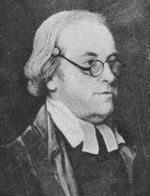 David Hartley was an English philosopher and founder of the Associationist school of psychology.
David Hartley was an English philosopher and founder of the Associationist school of psychology.
He was educated at Bradford grammar school and Jesus College, Cambridge, of which society he became a fellow in 1727. Originally intended for the Church, he was deterred from taking orders by certain scruples as to signing the Thirty-nine Articles, and took up the study of medicine. Nevertheless, he remained a member of the Church of England, and was on intimate terms with the most distinguished churchmen of his day. He considered it his duty to obey ecclesiastical as well as civil authorities. The doctrine to which he most strongly objected was that of eternal punishment. Hartley practised as a physician at Newark, Bury St Edmunds, London, and lastly at Bath, where he died.
His Observations on Man was published in 1749, three years after Condillac’s Essai sur l’origine des connaissances humaines, in which similar theories were expounded. It is in two parts–the first dealing with the frame of the human body and mind, and their mutual connections and influences, the second with the duty and expectations of mankind. His two main theories are the doctrine of vibrations and the doctrine of associations. His physical theory, he tells us, was drawn from certain speculations as to nervous action which Isaac Newton had published in his Principia. His psychological theory was suggested by the Dissertation concerning the Fundamental Principles of Virtue or Morality, which was written by a clergyman named John Gay (1699-1745), and prefixed by Bishop Law to his translation of Archbishop King’s Latin work on the Origin of Evil, its chief object being to show that sympathy and conscience are developments by means of association from the selfish feelings.
The outlines of Hartley’s theory are as follows. Like John Locke, he asserted that, prior to sensation, the human mind is a blank. By a growth from simple sensations, those states of consciousness which appear most remote from sensation come into being. And the one law of growth of which Hartley took account was the law of contiguity, synchronous and successive. By this law he sought to explain, not only the phenomena of memory, which others had similarly explained before him, but also the phenomena of emotion, If reasoning, and of voluntary and involuntary action.
Hartley’s physical theory gave birth to the modern study of the intimate connection of physiological and psychical facts, though his physical theory in itself is inadequate. He believed that sensation is the result of a vibration of the minute particles of the medullary substance of the nerves, to account for which he postulated, with Newton, a subtle elastic ether, rare in the interstices of solid bodies and in their close neighbourhood, and denser as it recedes from them. Pleasure is the result of moderate vibrations, pain of vibrations so violent as to break the continuity of the nerves. These vibrations leave behind them in the brain a tendency to fainter vibrations or “vibratiuncles” of a similar kind, which correspond to “ideas of sensation.” This accounts for memory.
The course of reminiscence and of the thoughts generally, when not immediately dependent upon external sensation, is accounted for by the idea that there are always vibrations in the brain on account of its heat and the pulsation of its arteries. The nature of these vibrations is determined by each man’s past experience, and by the circumstances of the moment, which causes one or another tendency to prevail over the rest. Sensations which are often associated together become each associated with the ideas corresponding to the others; and the ideas corresponding to the associated sensations become associated together, sometimes so intimately that they form what appears to be a new simple idea, not without careful analysis resolvable into its component parts.
Starting from a detailed account of the phenomena of the senses, Hartley tried to show how, by the above laws, all the emotions, which he analyses with considerable skill, may be explained. Locke’s phrase “association of ideas” is employed throughout, “idea” being taken as including every mental state but sensation. He emphatically asserts the existence of pure disinterested sentiment, while declaring it to be a growth from the self-regarding feelings. Voluntary action is explained as the result of a firm connexion between a motion and a sensation or “idea,” and, on the physical side, between an “ideal” and a motory vibration. Therefore in the Freewill controversy Hartley took his place as a determinist. It was only with reluctance, and when his speculations were nearly complete, that he came to a conclusion on this subject in accordance with his theory.
Major Works of David Hartley
– Observations on Man (1749)
– Some Reasons why the Practice of Inoculation ought to be Introduced into the Town of Bury at Present (1733)
– Ten Cases of Persons who have taken Mrs. Stephens’s Medicines for the Stone (1738)
– Hartley’s Theory of the Human Mind, on the Principle of the Association of Ideas (1775)
Source:
1911 Encyclopedia Britannica

super article
Simply want to say your article is as surprising. The clarity for your post is just spectacular and i can suppose you are knowledgeable on this subject. Fine along with your permission allow me to take hold of your feed to keep updated with forthcoming post. Thanks a million and please continue the enjoyable work.
Sweet site, super layout, really clean and employ genial.